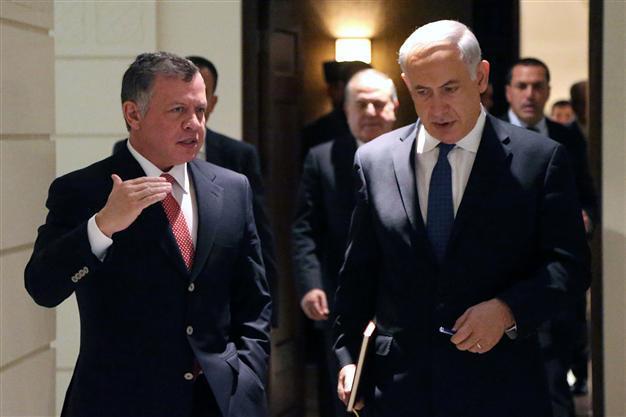Israel's Netanyahu holds rare talks in Jordan with king
AMMAN - Agence France-Presse

A handout picture released by the Jordanian Royal Palace on January 16, 2014 shows King Abdullah II (L) walking alongside Israeli Prime Minister Benjamin Netanyahu during their meeting in Amman on January 16, 2014. AFP Photo
Israeli Prime Minister Benjamin Netanyahu made an unannounced visit to neighbouring Jordan on Thursday for talks with King Abdullah II on the Middle East peace process, the royal court said.The rare meeting in the capital Amman comes as US Secretary of State John Kerry presses Israel and the Palestinians to agree on a framework to guide peace talks forward.
"King Abdullah and Netanyahu discussed peace process developments in light of the current US-sponsored Israeli-Palestinians peace negotiations," a palace statement said.
The palace said the meeting seeks to ensure any "progress in the peace talks would meet Palestinian aspirations and at the same time protect Jordanian interests, particularly final status issues at this critical stage".
It said the king told Netanyahu that "Jordan's interests top our priorities".
Abdullah urged Israel and the Palestinians to "seize the current opportunity and intensify efforts by Kerry to achieve tangible progress... and create the suitable atmosphere for the success of peace negotiations," said the statement.
It added in turn that Netanyahu briefed the Jordanian monarch on the peace talks, and on the US efforts.
Netanyahu's office said the meeting took place on Thursday morning, on his first visit to Jordan since February 2013.
"Prime Minister Netanyahu emphasised that Israel is putting an emphasis on security arrangements, which is also in Jordan's interest in any future agreement, and which will also take into consideration the peace accord between Israel and Jordan that was signed 20 years ago," it said in a statement issued after he returned to Israel.
Netanyahu stressed "the important role that Jordan is playing, led by King Abdullah, in the efforts to bring about an agreement," it added.
The two leaders also "discussed economic cooperation in a number of areas as well as other regional issues".
The peace talks have in recent months focused specifically on security, with Kerry and his team proposing a detailed plan for the Jordan Valley, where the West Bank borders Jordan.
The proposal would reportedly include the use of advanced technology, thereby allowing Israel to reduce or replace its troop presence on the ground.
Details published in the Israeli press indicate the US plan details arrangements for a transitional period and for a permanent status arrangement involving advanced technological equipment and unique weaponry, as well as early warning stations and security over air space.
Israel has always insisted that in any final agreement, it would have to maintain a military presence in the Jordan Valley and has rejected outright the idea of any third party involvement.
Netanyahu has also said Israel would only accept the emergence of a Palestinian state if it was demilitarised.
But the Palestinians have rejected outright the idea of Israel maintaining any kind of military presence in their future state although they would accept the deployment of a third party along the frontier.
And this week, Israeli Defence Minister Moshe Yaalon dismissed the security plan, saying it "isn't worth the paper it was written on" which, along with several insulting remarks about Kerry, drew a sharp public rebuke from Washington. Kerry left the region last week following four days of intense meetings with Israeli and Palestinian leaders, during which he failed to secure an agreement on a framework.
The US diplomat coaxed Israelis and Palestinians back into direct negotiations last year and has since shuttled tirelessly between the two leaderships in a bid to keep the talks alive.
Jordan and Saudi Arabia will be key to any peace deal.
Jordan's historic role in the guardianship of Muslim sites in Israeli-annexed Arab east Jerusalem is recognised under its 1994 peace treaty with Israel.
And Saudi Arabia authored a 2002 peace plan which is the basis for Arab aspirations for any deal.
Kerry, who has pledged any accord will be "fair and balanced," acknowledged on Wednesday the difficulties that still lie ahead to achieve a framework deal within the nine months the two sides agreed to when they relaunched talks in July.
















